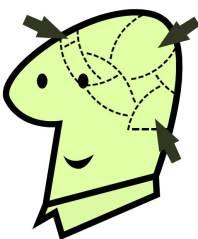Edward M. Hallowell, MD, is the author of Shine; Using Brain Science to Get the Best from Your People. He’s a psychiatrist who has spent decades thinking about why some people are engaged on the job and can shine, and why others are depressed, bored (or the opposite – overwhelmed) and unsuccessful.
The first principle to shining, he writes, is being in the right place. If you are not well matched to your job or your duties, you’ll be miserable, and it will show. One of the factors that determines your match for a job is what the founder of Kolbe Corp and the Center for Conative Abilities, Kathy Kolbe, calls “conation.” She is considered to be the world’s leading authority on human instincts and spent years studying children before applying her theories to adults.
According to Kolbe, Conation is the faculty of the brain that drives you to take purposeful action according to your instincts. Conative abilities are the natural, inherent and unchanging talents that, when acted on, lead to success and well-being as you use your creative energy to solve problems.”

The word conation comes from the Latin term conari, meaning “to try.” How you approach problems is an essential part of how you work every day. There are people who, when they need to know how to do something, stat by observing others – watching and observing until they feel comfortable. Others just jump in and start doing a task, getting their hands dirty and not worrying about getting it right the first time. There are people who dive into research and theory, and others who sit and ponder a problem, looking for inner wisdom.
The point is that your style is hard wired. Just like your eye color or height, it’s part of who you are. No amount of training or “fixing” will change you; when the next new task or problem comes around, you’ll revert back to your innate style. Your conative style is not related to your IQ, your education, or your job. It’s just who you are.
Author Edward Hallowell describes the mind as having three main drivers: emotion, conation, and cognition (thought process.) Emotions are the ignition switch for what you do, what literally “turns you on” to a problem or situation. Are you frightened by it? Intrigued? Excited? That’s what starts the process for you. Conation is the method you use to jump in and get started – how you approach the discovery phase. Finally, cognition, the way you think, helps you analyze results, correct course, and produce a finished product.
Kolbe has observed four primary conative modes. People may be “resistant” to a mode (meaning that they intuitively spend almost no time in this mode), “insistent,” meaning that they must do it this way or be very frustrated, or “accommodating,” meaning that the person uses the situation to determine how strongly to follow this mode. The scores along a scale from “resistant” to “insistent” do not imply “good” or “bad” traits; they simply describe a style that’s inherent to your personality.
The four styles are:
- Fact Finder: those who ask many questions and gather facts before taking action
- Follow Through: those who organize and create systems before taking action
- Quick Start: those who dive in and figure it out for themselves, often with disdain for how it’s been done before or conventional approaches. Their outcomes may also be unconventional.
- Implementer: the hands-on person who naturally takes things apart and can build or repair things with ease.
You may already see yourself in one or more of these styles. You probably also see your boss, your coworkers and your family members. Next time your coworker starts install the new equipment without reading the directions, you’ll be able to recognize (and appreciate) his strong Implementer style, which makes your Fact Finder blood run cold. And he promises to sit still while you review the purchasing policy (all seven pages of it) before discussing which vendor proposal to select. A great team is balanced.

